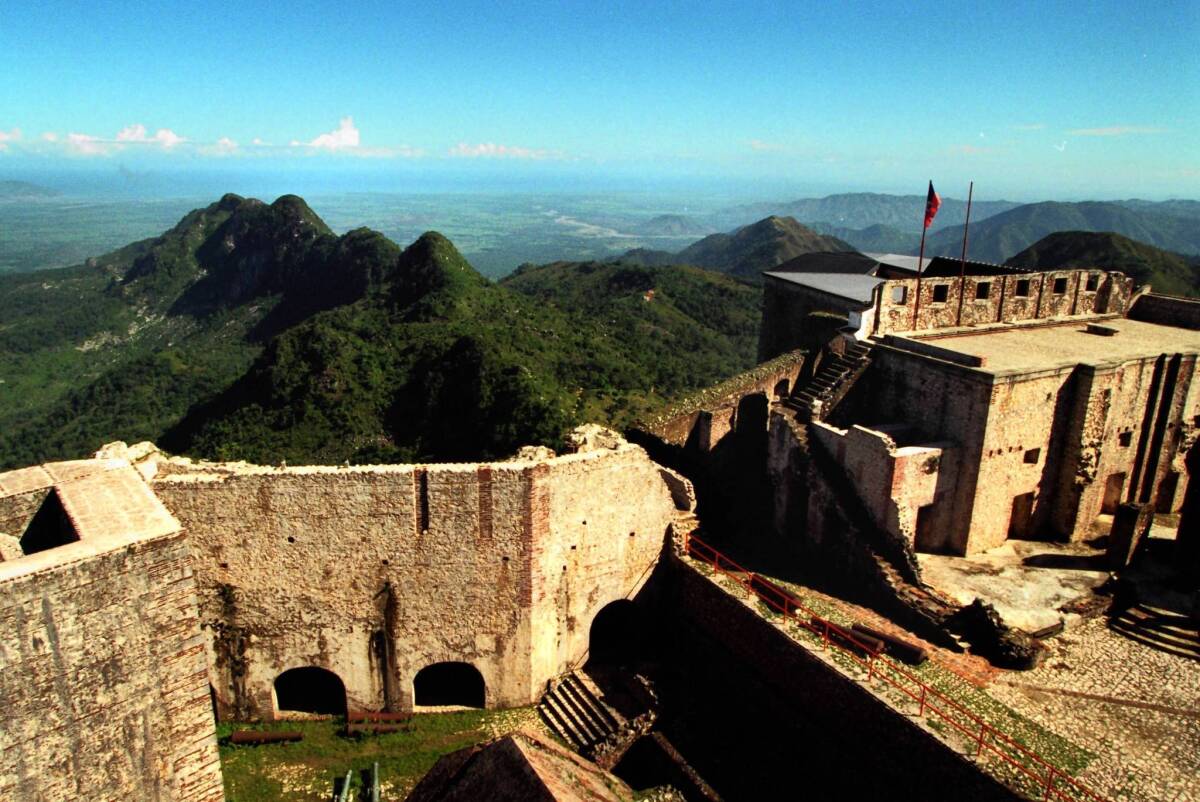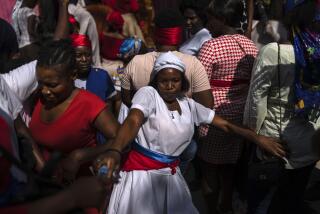For troubled Haiti, tourism is a tough sell

- Share via
MIAMI — The billboard on Interstate 95, with its azure sea and sugar-colored sand, could have been an ad for any of the myriad tropical destinations hoping to woo travelers abroad.
But the tag line might be surprising to some: “Haiti, Live the Experience.”
The billboard, which was erected in August by the Haitian government, is the latest salvo in what the country’s tourism officials and hospitality industry say is a battle to re-brand a country known more for political unrest and natural disasters than its historical landmarks and natural beauty.
“We can’t keep seeing the negative; we have to start somewhere,” said Guy Francois, Haiti’s vice consul to Miami. “We just need to bring awareness to the country. We need to get the pride back.”
The focus on attracting travelers comes as Haiti’s Ministry of Tourism embarks on an ambitious worldwide pitch, traveling to tourism fairs in Latin America and Europe and whizzing a global tourism czar along on a helicopter tour.
But some industry experts, as well as some Haitians in the diaspora, say pitching Haiti as a generically tropical destination ignores more marketable traits unique to Haiti.
“If they sell beaches, sun and palm trees, they’re going to lose,” said Bruce Turkel, a Miami-based marketing expert who has worked as a brand consultant for Puerto Rico. “There are plenty of audiences that will go to Haiti happily, like adventure travelers and cultural tourists, whether they’re interested in music or art. That’s what Haiti needs to concentrate on.”
Haiti must compete with its next-door neighbor, the Dominican Republic, which has perfected the all-inclusive resort package complete with beaches and day excursions. In 2011, Dominican Republic travel and tourism supported 170,000 jobs, according to the World Travel and Tourism Council.
By comparison, the tourism trade in Haiti provides about 10,000 jobs, according to Haiti’s Ministry of Tourism.
Some entrepreneurs are pinning their hopes on adventure travel, a potentially lucrative market that taps travelers who may be more forgiving of the country’s famously rough roads and dicey infrastructure.
Philip Kiracofe, founder of marketing agency Travelcology, said Haiti is the ideal location for adventure tourism with its mountains and remote rural routes.
Kiracofe launched Mountain Bike Ayiti Project to promote sustainable adventure tourism. The group plans to host its first race in January from Port-au-Prince to Jacmel.
“Slowly, the word is spreading out: ‘Hey, it’s not as bad as you think,’” Kiracofe said. “Haiti is pristine in many ways.”
As Haiti builds on its infrastructure to better accommodate leisure tourists, experts say it is the Haitian community abroad that will be most patient in the nascent stage of the tourism movement. The country suffers from regular power outages, shoddy roads and unpredictable politics.
“Of course the political situation is always a mess, but the people need to see that the country is not only what they see on the news after a disaster,” said Nancy Roc, a Haitian journalist based in Canada, who recently released a French-language travel e-book highlighting Haiti’s must-see locales and culture.
“Haiti is not Port-au-Prince,” she said of the nation’s capital, which was hard-hit by the 2010 earthquake.
Still, Port-au-Prince is where the focus on new hotel rooms has been in recent years as the Occidental’s Royal Oasis and Best Western hotels, within walking distance of each other in Petionville, prepare to open next month.
Haiti’s image has suffered for decades. In 1982, the Center for Disease Control listed Haitians as a high-risk group for HIV/AIDS. Two years later, it removed Haitians from the list, but lasting damage had been done. Throughout the 1990s, political unrest and coups dominated headlines internationally. And in recent years, hurricanes and the 2010 earthquake have left cities in ruins and hundreds of thousands homeless.
The push to reshape how people think about Haiti is not unprecedented. Some Caribbean countries like Jamaica have also battled damaging perceptions but nevertheless emerged as tourism strongholds largely because of effective marketing.
The “Come Back to Jamaica” campaign of the 1980s spurred Jamaica’s weakening tourism economy.
Many travelers may point out that they’ve already been to Haiti: Royal Caribbean ferries thousands of tourists a year to beachfront Labadie, which the cruise line calls Labadee and leases from the Haitian government.
Although Royal Caribbean has been credited for bolstering the Haitian economy with a $10 “head tax” per passenger, tourists who visit don’t see much of Haiti beyond the fenced-in beach attraction.
“As far as any traveler knows, Labadee is not Haiti,” said Turkel, the marketing expert. “If you travel to Labadee, you’re getting a generic Caribbean experience.”
Green writes for the Miami Herald/McClatchy.
More to Read
Inside the business of entertainment
The Wide Shot brings you news, analysis and insights on everything from streaming wars to production — and what it all means for the future.
You may occasionally receive promotional content from the Los Angeles Times.










